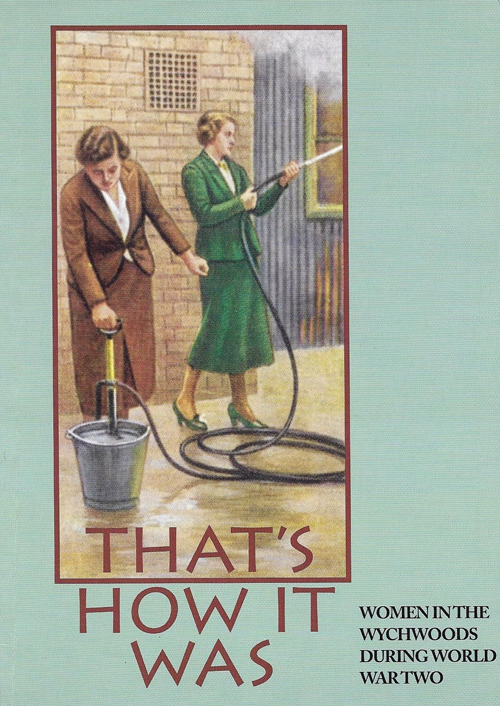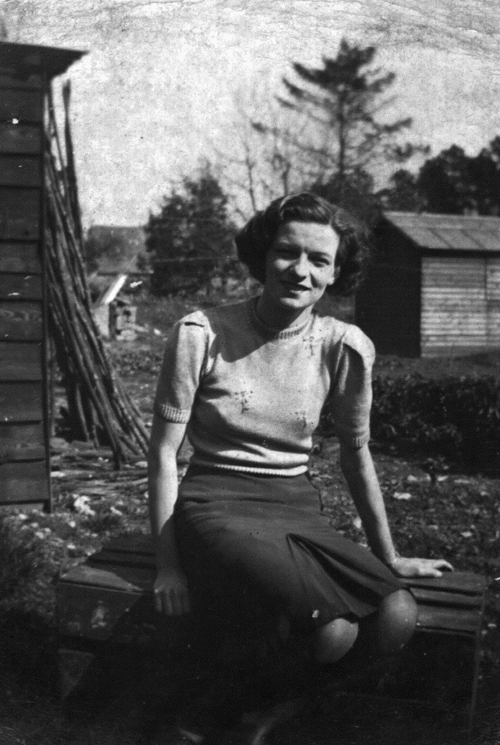“That’s How it Was” | Introduction | Wychwood Women : The Interviewees | Declaration of War | The Arrival of Evacuees| School Time | Preparing for War at Home | Soldiers and Airmen | For the Common Cause | Dr Scott and the Canteen | Domestic Life | We Were Lucky Out Here: Food Rationing | Work for Women Outside the Home | The Effects of War

… from the Wychwoods “That’s How It Was” Publication
While recording our interviews, we were all struck by the frequent mention of Dr Gordon Scott, father of the present Dr Scott.
Having been refused entry into the armed services because it was thought he would be more useful where he was, he did his utmost for the war effort from home. As well as looking after the health and welfare of the community, the name of Dr Scott was raised in many contexts – district councillor, secretary of War Savings for Chipping Norton Rural District, raising funds for use both at home and abroad, entertainment, and, particularly, the canteen.
In 1940 Dr Scott started a canteen in the YMCA Red Triangle on the present site of the entrance to Courtlands Road. The idea was to provide somewhere for evacuees and their mothers to go to give their foster mothers a rest and to raise money for the founding after the war of a Wychwoods Social Centre, which sadly did not materialise. Only the cooks were paid; otherwise it was entirely staffed by volunteers. Joan Hall worked there throughout the war and her sister, Mabel Souch, was one of the cooks.
Who actually organised it?
‘Dr Scott did it all’.
And he found people to volunteer and man it?
‘Oh yes. He brought all the vegetables up before surgery in the morning out of his garden. That was for the lunches’.
So it opened in the morning at 9 o’clock?
‘9 o’clock and closed at 10 o’clock at night’.
And how many people could be fed there?
‘It must have been a lot because of course there were several soldiers and troops and they were nearly always in there. And lunch times there were quite a lot of children came up. There was no where else where you could get anything to eat. It was quite good. The evacuees, that was the main reason he started it, lunches for the evacuees. He always came in early in the morning and in the evening to see if there was anything we wanted.
In the mornings the troops came for coffee or whatever they wanted. And in the evenings they came for a cooked meal, eggs and bacon and things like that in the evening. Of course there were no school dinners at that time. So some of the school children used to come and lots of people who were working women.
They came and got their husbands’ and their lunch. And quite a lot of people, the district nurse and different people like that all used to come and have their meals. But we took it in shifts. Of course it was unpaid. There were two cooks for lunch [who] were paid. I laid the tables, that’s the job I did at lunch time. That was 5 days a week, no week ends but as for the troops coming in in the morning and in the evening that was every day, Saturdays and Sundays and weekdays and all and that was all voluntary’.
What sort of meal was served at lunchtime? Stew?
‘Yes and fish’.
Some sort of pudding?
‘Yes. Rhubarb pudding. Done in a saucepan in a cloth, you know the sort that they used to do years ago. Yes they had some good meals. My sister was a good cook’.
With the tea and coffee, were biscuits served?
‘Yes, tea and coffee and biscuits. And we sold chocolates and cigarettes’.
And how much did people pay?
‘For their lunches they started off at sixpence each and then they decided that that didn’t cover it – that was with a cup of tea. So then you paid a penny extra for a cup of tea. And that was all I can remember anybody paying’.
And tea and coffee in the morning, that was a penny?
‘Yes, that was it if they had it on its own. I know we did Sunday nights, my sister and I and a friend perhaps. And a cooked meal. Shall I tell you what I cooked one night? I’m always bragging to Jim about it. Ninety fried eggs and I never broke a yolk. That’s all I have ever done in my life to make me stand out! That’s what I always remember. That was for the soldiers’. Joan Hall

Naturally Betty Scott also remembers her husband’s involvement with the canteen. He would get supplies from anywhere he could and cajoled volunteers to help. Fruit and vegetables came from anyone who could be persuaded to give them. ‘He did all the ordering and got the stuff from everywhere, and I had one night a week cooking chips and eggs for the men. And we tried to introduce tripe and onions because they were north country men and they loved tripe and onions but it didn’t go down very well and I had to spend hours cooking the beastly stuff’.
So where did all the produce come from, or don’t we ask?
‘We don’t ask. I don’t know where, I think he was allowed certain amounts of certificates. I think people helped with eggs and things and of course he would buy potatoes locally‘.
What did they cook on?
‘Gas. Several times farmers gave him masses of rooks because they were such a nuisance and he used to get up at about 6 o’clock in the morning and cut the breasts out and I had to cook rook pie. But it didn’t go down well. Some of them were a bit more adventuresome but felt that the fresh done eggs and chips were best’. Betty Scott
“That’s How It Was” Menu
These pages are reproduced from the Society’s publication “That’s How It Was”, featuring women in the Wychwoods during World War Two. The texts and images were published in the year 2000, and deserve a place in our expanding online archive. Please bear in mind as you read our texts in these pages, that we reproduce them as published in the year of publication.
Select from:
“That’s How it Was” | Introduction | Wychwood Women : The Interviewees | Declaration of War | The Arrival of Evacuees| School Time | Preparing for War at Home | Soldiers and Airmen | For the Common Cause | Dr Scott and the Canteen | Domestic Life | We Were Lucky Out Here: Food Rationing | Work for Women Outside the Home | The Effects of War

